12 Moments in History That Define Scotland

Embedded into the social fabric, history informs the cultural psyche of a place. Without history and the people that make it, there wouldn’t be culture. Scotland’s past is filled with a handful of diverse happenings and noteworthy people, from game-changing battles and discerning clansmen, to Vikings, revolutionary thinkers and key political events. Here are just 12 of the many moments in Scottish history that help define Caledonia as she is today.
Roman Empire
Although hunter-gatherer communities lived in Scotland in 10,000 BC during the Paleolithic Era, with the first prehistoric tools dating from 3000BC and the first long-term homes found in The Heart of Neolithic Orkney World Heritage Site, the first instances of recorded history go hand in hand with the arrival of the Roman Empire. Scotland, or Caledonia to the Romans, was never truly conquered by Roman invaders, despite their efforts as demonstrated by Hadrian’s Wall by the northern border and central Scotland’s Antonine Wall.

The Vikings
Scotland’s Norse heritage is ingrained into the Scottish national identity, especially in Shetland and Orkney. Around 800AD, Vikings rode the manic swelling seas from Norway and Denmark until Scotland came into focus. Still alive today, Shetland’s Up Helly Aa fire festival pays homage to the land’s Viking roots. Many Scots words stem from Old Norse words.

The Declaration of Arbroath
1320 marks the Declaration of Arbroath, a cornerstone in Scottish history that acknowledged Scotland’s status as an independent sovereign state. The Declaration came in a letter signed by Scottish dignitaries in Latin and was sent to Pope John XXII. There are some who see this Declaration as a seed planted for the founding fathers of America before crafting the United States’ Declaration of Independence.

The Scottish Reformation
Following a series of heated sermons led by John Knox, the year 1560 marks the beginning of the Scottish Reformation. Religion, being an influential power on the people, saw a turbulent time during the Reformation, as Scotland wandered away from the Papacy and placed focus upon Presbyterian teachings. New laws entered into the equation involving the abolition of Catholic mass and the Pope’s thumb on Scotland.

The Union Of The Crowns
An integral moment in British history, 1603 saw the Union of the Crowns after the death of Elizabeth I of England, who left the world with no immediate heirs or husband. Due to the unique situation, the crown was handed to the next heir, James VI, King of Scotland. Her cousin united the crowns and went onto make history by becoming King James VI of Scotland and James I of England.

Glencoe Massacre
No amount of time can diminish the memory of the lives lost during the Glencoe Massacre. A sore spot in Scotland’s history, this traitorous slaughtering happened on 13th February 1692. As members of the Clan MacDonald rested in their slumber, many endured a startling awakening when members of Clan Campbell murdered the MacDonalds, including the Clan Chief. Adding fuel to the flame, this dark incident occurred after the Clan MacDonald hosted Clan Campbell at Glencoe for a number of days before the massacre — the ultimate betrayal.

The 1707 Act Of Union
Before The Act of Union in 1707, both England and Scotland were separate entities with their own parliaments living under one monarch. This Act introduced a single parliament and so, the United Kingdom of Great Britain was born, with the first ever UK Parliament meeting commencing in May of that year.

The Battle Of Culloden
With popular television shows like Outlander and Game of Thrones mirroring many events (particularly battles) in British history, it’s no surprise that historic sites like the Culloden Battlefield are witnessing more visitors. 1746 witnessed the slaying of countless men on both sides and marked the end of the final Jacobite Rising, changing history as we know it.

Highland Clearances
Another tragic moment in Scottish history, the Highland Clearances followed swiftly after the Jacobite demise at the Battle of Culloden in 1746. The Clearances coincided with laws pointed towards ‘cultural assimilation’ of the Highland communities, which many consider ethnic cleansing. During this period, Clan chiefs were stripped of all jurisdiction rights, tartan was outlawed and the use of Gaelic downright prohibited.

Age of Enlightenment
Scotland has long been associated with a colossal array of revolutionary thinkers, philosophers, writers and creatives alike, all of whom were major contributors in the Age of Enlightenment. During the 18th and 19th centuries, the Scottish Enlightenment saw minds like Thomas Hobbes, David Hume, Adam Smith, Robert Burns and Sir Walter Scott pioneering the frontiers of intellect and innovation, putting Scotland on the map as a ‘hotbed of genius’.

Scottish Parliament Reconvened
A monumental occasion for Scotland, the Scottish Parliament reconvened on the 12th May 1999, a milestone that marked the first time in nearly 300 years after the 1707 Act of Union. SNP MSP Dr Winnie Ewing, the oldest member, chaired the first meeting of Scottish Parliament and opened with the words: ‘I want to start with the words that I have always wanted either to say or to hear someone else say — the Scottish Parliament, which adjourned on March 25, 1707, is hereby reconvened’. Scotland’s devolved government oversees the likes of Scottish healthcare, transport, justice, rural affairs and education.

The Scottish Independence Referendum Of 2014
The Scottish Independence Referendum on the 18th September 2014 made a significant impact on the Scottish psyche and national identity. Voters were posed one simple question — should Scotland be an independent country? — and were asked to respond with a ‘yes’ or ‘no’. At 84.6%, a substantial amount of people voted. A close call, the naysayers won with 55.3% of votes, with aye-voters coming in at 44.7%. Although Brexit now commandeers all political discourse, it’s only a matter of time before a second Scottish Independence Referendum enters into the equation.














